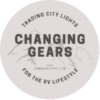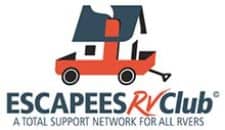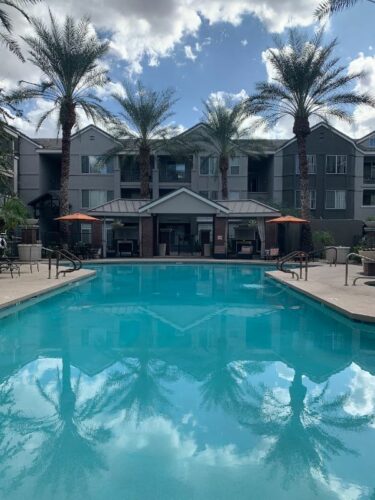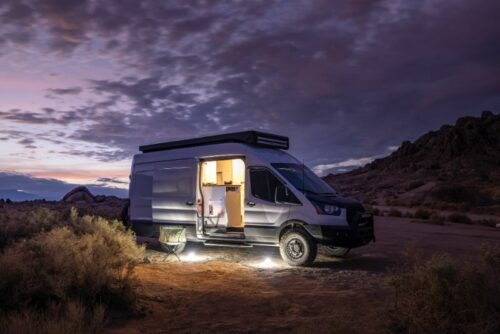If you’re a new RV owner, it’s important to understand what your RV insurance policy covers.
Your policy likely includes liability coverage, as well as coverage for the structure of your RV, its contents, and any medical expenses incurred in an accident.
However, there are some exclusions to be aware of. For example, full-time RVers may be excluded from coverage if they live in their RV for more than six months out of the year. And, if you take your RV overseas or into Mexico or Canada, your policy may not cover you.
Here’s a closer look at what RV insurance typically covers, as well as some important exclusions to take note of!
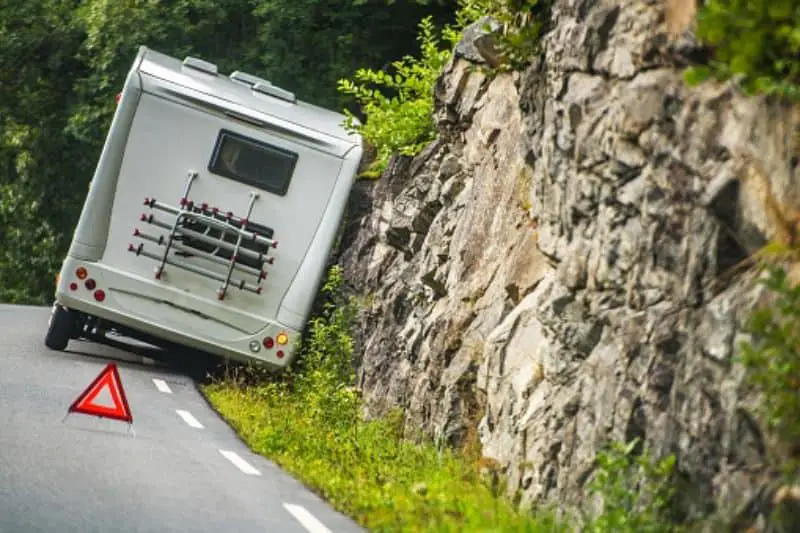
Basic RV Insurance Coverages
Comprehensive and collision coverage
Comprehensive insurance covers your RV for occurrences outside of your control, such as theft, vandalism, fire, glass breakage, weather-related incidents, and animal collisions.
Regardless of who’s at fault, collision coverage will repair or replace your RV if it is damaged in an accident with an object or another vehicle, such as driving into a tree, telephone pole, or deer.
Note: A deductible is required on both comprehensive and collision coverage.
Bodily injury liability
If you are at fault in a vehicle accident, bodily injury liability coverage will reimburse the medical expenses of those who were hurt, with the exception of yourself. In addition, this coverage covers legal defense costs if you are sued for compensation.
Note: This is normally covered by the tow vehicle’s insurance if you’re towing a camper trailer.
Property damage liability
If you cause damage to someone else’s property as a result of an accident, this type of liability insurance will cover any financial responsibility.
Uninsured motorist (UM)
For situations where an individual has no insurance but was at fault in a vehicle accident.
Underinsured motorist (UIM)
When the other driver has insurance but not enough to cover the full amount of damage.
Medical payments
Covers all of the medical bills from being in an accident, regardless of fault. This includes emergency transportation, healthcare expenditures, follow-up doctor visits, and funeral expenses.
Note: Some travel trailer policies exclude this coverage, since it’s covered by the tow vehicle’s insurance.
Optional RV Insurance Coverages
Depending on your needs, you can choose to add the following optional coverages to your RV insurance policy. Please note that not all insurers provide all coverages!
Roadside Assistance
This insurance covers everything from:
- Flat tires
- Lockout and locksmith services
- Gasoline/diesel fuel delivery
- Extrication services
Some policies include towing services in Roadside Assistance. Others sell the service separately.
Usually, you’ll be towed to the nearest repair facility within the insurer’s network. You can also ask to be towed to a specific service facility, but the free distance will either be limited to 25, 50, or 75 miles, after which you’ll pay a fee of $75-$100, usually.
Note: Some policies limit the distance your RV is disabled from a main road or highway! Progressive, for instance, states your RV must be within 100 feet of a road or highway. So don’t expect a savior if you’re stuck on a fire road.
Replacement Cost/Personal Effects
This coverage protects everything you transport in your RV, including valuables and personal belongings. Examples include clothes, smartphones, cameras, shoes, bicycles, and jewelry.
You must state in the contract what the estimated amount of your valuables are (often $5,000 – $20,000), and the cost of this coverage will vary depending on how much you claim.
Usually, this policy pays out before any other insurance so you can avoid having to file a homeowners insurance claim.
Emergency/Interruption Expenses
If your RV is stranded due to an accident more than 50 miles away from your home, the insurance company will pay for transportation, meals, and accommodation expenses up to a certain amount (usually $750).
In some policies, these “trip interruption expenses” are included in the Towing & Labor coverage.
Vacation Liability
You’ll be covered (usually up to $10,000/$500,000 in liability coverage) if someone gets injured inside or around your RV while you’re away on vacation.
This coverage only applies if your motor home is parked on private routes and while it is used for recreational purposes.
It does not overlap with or piggyback onto any automobile liability coverage.
Full-Timer RV Insurance
If you use your RV for more six months out of the year or claim it as your primary residence, you may be eligible for Full-Timer RV insurance coverage.
- Medical Payments. You are protected to the extent that you are responsible for injuries incurred in and around your RV.\
- Personal Liability. If you’re at fault for an accident that causes property damage or any/all injuries while the RV is stationary, your damages will be covered.
- Loss Assessment. Pays for fees charged by an association that covers repairs to common areas or parts of the property where your RV is parked.
Many insurers do not offer full-time RV insurance. Those that do are normally upfront about it. Good Sam, for instance, describes their Full-Timer Coverage as similar to “a homeowner’s policy for RVers.”
Total Loss Replacement/Actual Cash Value Reimbursement
Total Loss Replacement
With Total Loss Replacement, the insurer will pay for a new RV if your motorhome or travel trailer is destroyed in an accident. That means if you paid $75,000 for your new motorhome last year and it’s now worth $50,000, it will be replaced with a new RV of the same model year and trim level or better—even if it costs more than what you originally paid.
If you opt to keep the damaged RV rather than swap it out, the insurer will refund the amount paid for the original purchase price, minus your deductible.
Actual Cash Value
Note: In contrast, if your RV is more than five years old, some insurers will normally only pay out whatever limit is listed on your policy – NOT the purchase price! (Good Sam is a notable exception. They don’t reduce the reimbursement by depreciation, but you must purchase Replacement Cost Coverage during the RV’s model year or within the following four years.)
Alternatively, some cheaper policies will only reimburse you the actual cash value. If you have actual cash coverage, your insurance company will reimburse the current depreciated cash value of your RV, not what you originally paid for it.
Limited Pet Coverage
More and more RV insurers are beginning to offer integrated pet accident coverage. Progressive pays up to $1,000 to cover an injured pet’s vet bills. American Family Insurance covers veterinary care and burial or disposal costs up to $1,000, regardless of the number of pets.
If your insurer does not offer pet insurance, you can purchase a standalone policy from another company.
Parts/Equipment Replacement
Different insurers offer different versions of this coverage.
- Progressive offers Roof Protection Plus, where they’ll pay to repair or replace the damaged roof of your motorhome or travel trailer while you’re traveling. Wear and tear to the roof of your RV is also included.
- Nationwide offers Safety Glass Replacement, where they’ll pay to replace the windshield on your RV motorhome.
- Good Sam covers awnings and attachments (levelers, tow kits, antennas) for the full amount it would cost to replace them with their Permanent Attachments Coverage.
Most parts on your RV are not eligible for separate coverage! Common items to be covered include membrane roofs, trailer hitches, and motorhome windshields.
RV Insurance Policy Exclusions
While most RV insurance policies cover a broad range of potential accidents and incidents, there are some exclusions that you should be aware of.
Foreign Travel into Mexico/Canada
Traveling out of the country or into Mexico may not be covered by RV insurance policies. Good Sam doesn’t cover it all, for instance.
In some cases, you are restricted by time and days, such as a Farmer’s RV Insurance policy, which limits coverage in Mexico in 25 miles of the Mexican border for up to 10 days. If you need more, you’ll need to arrange special coverage with your agent.
It’s more common to find policies that extend coverage to Canada, however. However, you might be limited by mileage and days, and you may need to update your insurance agent ahead of time.
Full-Time Living
Unless you specifically purchase full-timer RV insurance, not only is living or traveling full-time in your RV not covered, but it can only negate some of your coverage!
Water Damage Due to Lack of Maintenance
While many policies state that they cover water leaks, that doesn’t mean they cover all types of water damage! In particular, anything that can be blamed on you or the manufacturer won’t be covered.
- Manufacturer defects. If water penetrates your RV and damages your belongings because of a manufacturing flaw, your insurance coverage may not reimburse you for the loss.
- Lack of maintenance. If your RV is not properly maintained and causes water damage, your insurance may not cover the loss. This includes any water damage as a result of corrosion or rust.
- Accumulation of snow and ice. If you don’t clear snow and ice off your RV in the winter or store your rig under an RV carport, your insurance may decline your claim.
And don’t expect the RV manufacturer to save the day! Many manufacturers’ warranties stipulate that exterior seals are only covered for 90 days after purchase. After that, it’s your responsibility to religiously maintain them. If you can’t prove that, the onus is on you.
RV Insurance Policy Coverage FAQs
Can I Get Seasonal RV Insurance?
Seasonal RV insurance, often known as RV storage insurance or RV lot insurance, is a type of coverage that reduces collision coverage in order to save you money (since the RV will not be on the road).
You may “turn off” the coverages you don’t need throughout the months you’re not using your RV. You will still be protected from hazards such as theft, weather, and Acts of God.
What Is Considered a “Totaled” RV?”
After receiving an estimate for repair, an RV may be repaired or declared a total loss. If the repair price is at least 75% of the cash value of the RV, it is deemed a total loss.
If an RV is totaled, the insurance company will normally dispose of the rig at auction or salvage yard. Some companies may sell the RV back to you for scrap value if you want to be responsible for fixing the RV yourself.
Does My RV Insurance Policy Cover Other Drivers?
When you buy RV insurance, you select the drivers who will be covered by your policy. You may call your insurance provider if you need to add more drivers to your policy.
Does RV Insurance Cover Theft?
Yes, RV insurance covers theft!
Is RV Insurance Legally Required?
Motorhomes are required to at least have liability insurance while being driven in the U.S.
When it comes to towable RVs, the laws vary by state in terms of both the type and amount of coverage legally required. Research your local laws or speak to your insurance agent. In most cases, either separate insurance is required (for motorhomes or towables), or the RV must be adequately covered by your tow vehicle’s policy.
Are All Types of RV Insurable?
99% of RVs in North America are easily insured by agencies: Class A’s, Class B’s, Class C’s, travel trailers, 5th wheels, pop-up campers, truck campers, teardrop campers, horse trailers, etc.
You may need to present additional information if you’re insuring a homemade RV, however, such as a DIY conversion fan or a “skoolie” bus conversion.
Does my RV Need to Be Registered in to Get Insurance?
If you want your insurance policy to cover you while on the road, then yes, you normally need to register your RV with your state DMV.
Andy Herrick is a blogging nerd, #8 Enneagram, wannabe bread baker, INTJ, RV industry professional, and small business entrepreneur. He can be found hanging out with his lovely wife and family, skiing, cycling, climbing, hiking, and convincing anyone who will listen why dogs aren’t really that great of pets. Also, he runs this website.
-
Andyhttps://changingears.com/author/andrew-herrick/
-
Andyhttps://changingears.com/author/andrew-herrick/
-
Andyhttps://changingears.com/author/andrew-herrick/
-
Andyhttps://changingears.com/author/andrew-herrick/
